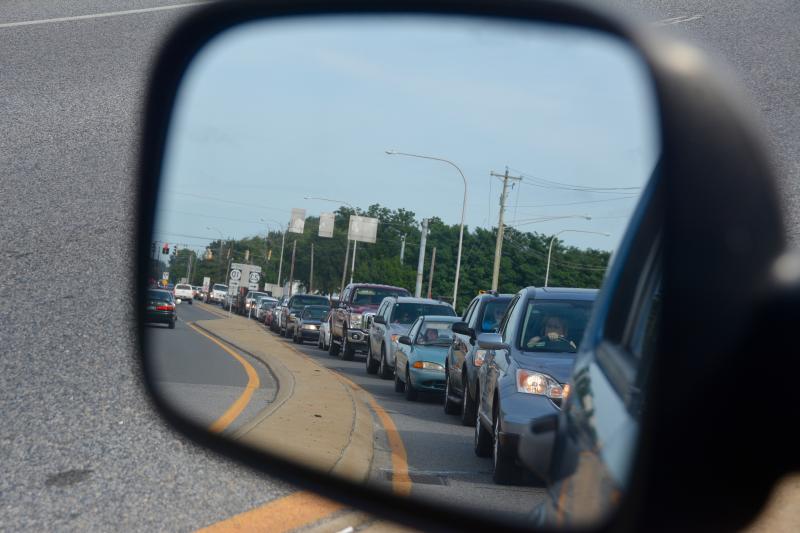State spending blamed for Sussex traffic problems
Misuse of state funds was blamed for Sussex County's ongoing transportation and traffic woes at a recent meeting to discuss the county's new comprehensive plan.
“The state has not done a good job at all,” said Sussex Planning and Zoning Commissioner Marty Ross, who joined Commissioner Kim Hoey Stevenson to discuss the comp plan at an Eastern Sussex Republican Club meeting at Lewes Public Library May 15. Fewer than 10 Cape Region residents attended the meeting along with about 20 club members.
“We understand development is going to continue,” said club member Richard Ullcamp of Milton. “It's not so much development that's the problem. It's the fact that it's not supported by infrastructure and road improvements. I think the public would benefit from knowing more about what happens to the transfer [real estate tax] money. Where does that money go?”
Ross said language in the epilogue of the bond bill allows state legislators to divert funds from the Transportation Trust Fund, meant for infrastructure projects, as well as real estate transfer tax funds, meant to support the state's Open Space and Farmland Preservation programs, to other uses.
“They misspend that money, in my opinion, because it's not as promised to us, the taxpayers, as it was supposed to be,” Ross said. “As far as infrastructure, this is a huge problem. For 47 years, we've trusted the state of Delaware. We've given them the money. We've given them a lot of planning authority by law and regulation. And we just haven't received any dividends out of that.”
Ullcamp asked what happens to the 1.5 percent of Sussex County real estate transfer tax annually sent to state coffers.
“The money is going, and I don't think we're benefiting from that,” Ullcamp said. “The infrastructure hasn't kept up. Why is that?”
Ross said infrastructure projects in Sussex have not kept pace because the county is poorly represented in Legislative Hall. “If you can't win elections, when it comes time to negotiate a budget, who cares? It's a harsh reality.”
Hoey Stevenson said of 21 senators in Delaware, only five represent Sussex County.
“What has to be somehow negotiated is to know that if the state says we're going to match county funds for a specific purpose, we have to make sure we get that match,” Ross said. He estimated the county needs $300 million to $500 million for repairs to major roadways, including widening Route 404 and repairing routes 16, 24 and 9. The county will need state funds to pay for those repairs, he said.
“We are going to have to come up with more money somewhere,” Ross said. “We're not going to be able to do it on our own.”
In the meantime, increasing density in some areas may address the concern of sprawling development in the county, Ross said.
“That's one way to take pressure off,” he said. “The lower density you have, then the more miles of road you have, the more length of sewer you have to have, and the less possibility of public transportation.”
Club member Sandra Ware of Lewes agreed.
“We need density in order to make this successful,” she said. “I do land development as a commercial agent, and it's becoming prohibitive with the existing current zoning.”
Club member James Reed said putting two houses on every acre – the density permitted by agricultural-residential, AR-1, the most common zoning designation in the county – would make the area unlivable.
“How do you encourage people to build where you want them to and keep them from building two houses per acre wherever they want?” he asked.
Ross said when central sewer is unavailable, developers often don't apply to build at all.
“The other key is if we can agree to allow some density in exchange for a contribution to the land trust for open space; then the developers are going to build where you want to live,” he said. “Everybody, 70 percent of the people, want to live east of Route 30. … So if we can agree to a little bit extra density there, and with the contributions to the land trust, then you can really preserve a lot of land over a 10-year period.”
Hoey Stevenson said county officials and planners need suggestions from the public, not just complaints.
“We've gotten a lot of beefs and not a lot of suggestions,” she said, adding that as a fourth-generation Sussex Countian, she's recognized significant changes in the county's development. “I don't have all the answers, and I would love to hear some from people. I would love to hear some ideas from people.”
Officials are still drafting the 2018 county comprehensive plan and will hold additional public workshops in fall 2017 as well as planning and zoning public hearings. Ross said the plan would ideally go to legislators for review in early 2018.
For more about the plan, go to sussexplan.com.





















































